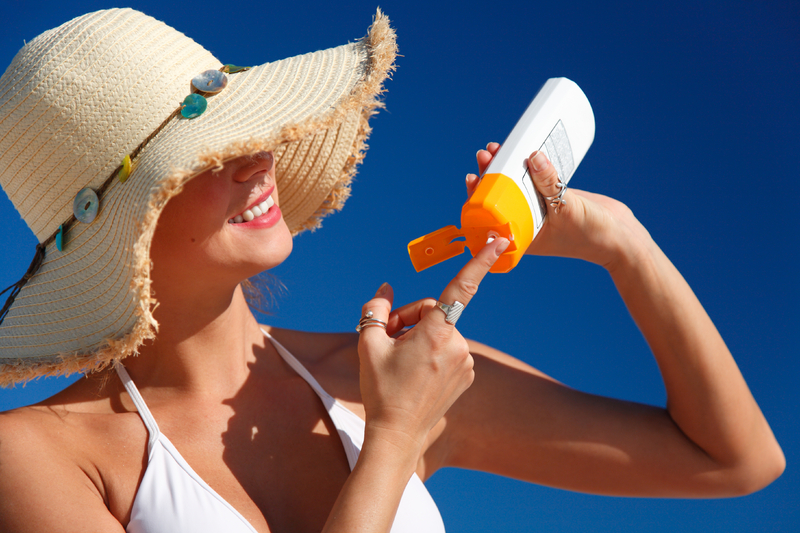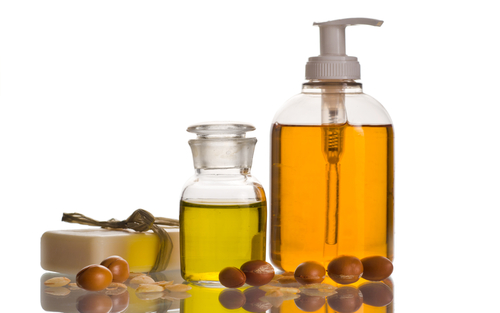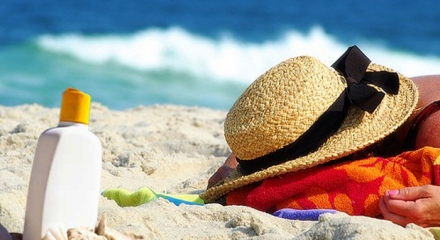Now that Spring is here, it is important to start refocusing on protecting yourself from the sun. Because we are always exposed to UV rays no matter what season it is, it’s important to always have an effective shield on our delicate skin.
First of all, I have some good news: getting a little sunshine is good for you. The sun, after all, helps to sustain life on our planet, produces vitamin D in our bodies and can help activate natural enzymes. Even more good news: antioxidants—used internally and externally—may contribute to your ability to stay outdoors longer before you burn and fight the free radicals that come with UV exposure.
That said, you do need to protect yourself, especially if you have prolonged exposure to the sun. You must prevent burning and skin cancer- of course! But not all sunscreens are created equal. Despite flashing crazy high SPF numbers meant to impress us, many sunscreens are loaded with chemicals and with exposure to the hot sun, can actually be harmful (I know, it’s annoying ironic, isn’t it!).
Don’t worry, there are plenty of ways to protect yourself from sun damage without giving up the chance to have some fun outdoors. Here are my thoughts:
What to Look for in a Sunscreen and What to Avoid
You don’t have to have both, but you need to have either titanium dioxide or zinc oxide listed as an active ingredient in the sunscreen you choose. These are natural ingredients, not chemical ones, that create a barrier between the UV rays and your skin. The chemicals that are so common in sunscreens get absorbed into your skin—not good! Your skin is your largest organ, so coating it in nasty chemicals is the last thing you want to do.
Look for sunscreens that don’t contain vitamin A. Though it sounds like it would be a good thing to add (it’s a vitamin, after all!) it makes your skin more sensitive to UV rays. The EWG states that 20 percent of beach and sport sunscreens, as well as face sunscreens and SPF-enhanced makeup products contain vitamin A. While it is an antioxidant, it shouldn’t be on your body with sun exposure. It could actually increase your risk for skin cancer.
You may also want to avoid oxybenzone. There’s conflicting information regarding its safety right now. One study said it led to increased cancer growth in mice (when ingested), while other scientists claimed it’s not harmful when used in sunscreen. Personally, I would skip it!
Don’t worry about whether the sunscreen has a seal of approval from the Skin Cancer Foundation on the bottle. Companies supposedly have to pay to have that endorsement, so not all of the sunscreens that deserve it will necessarily have it. Just as you do with food, always look at the ingredients list to determine whether it’s safe.
Other things to look for in your sunscreen:
- Broad spectrum UVA and UVB protection is best, with an SPF between 15 and 50.
- Lotions and creams are better than sprays because you won’t breathe in the particles that hit the air, not your skin.
- You won’t find any sunscreens marked “waterproof” or “sweat-proof” anymore, per the new FDA regulations, so there’s no need to look for those. You may see “water-resistant” but you’ll still need to reapply those every two hours and after you get out of the water if you’re going to be in the sun for a long time.
My favorite sunscreens are the Pratima Neem Rose Face Sunscreen, and the Pratima Neem Vetiver Body Suncreen. These sunscreens are both SPF 30, and combine botanicals with non-nano micronized Zinc Oxide. They are non-clogging (so you don’t have to worry about breakouts! That is a huge personal concern as well), and absorb well, so you don’t look like you’re trying to be part of a white-faced Japanese Kabuki theater production. :) There are so many chemical-free sunscreens that suck- they either break you out or they really, completely rub in.
It’s taken me a long time to feel comfortable recommending a sunscreen, and finally the day is here so check it out.
Using Natural Oils as Sunscreen
There’s some information floating around out there about using natural oils as sunscreens and forgoing the actual sunscreens completely. For example, red raspberry seed oil is said to have an SPF of 28 to 50, but it doesn’t appear to have gone through extensive testing to determine whether it’s okay to use it alone as your sunscreen yet. In one study on herbal oils used in cosmetics, scientists found that the SPF range varied from one to eight for the oils tested, with olive oil and coconut oil being the highest of the fixed oils (around eight) and peppermint oil and tulsi oil the highest of the essential oils tested (around seven).
The oils do have two things going for them: spreadability (you’re less likely to miss spots!) and quick and easy absorption. Carrier oils can be applied neat to the skin (meaning straight from the bottle), while essential oils are irritating to the skin if not diluted in a carrier oil, so covering your skin with olive or coconut oil to experiment will be fine, but don’t rub straight peppermint oil all over and expect good results (besides, who wants to smell like the inside of an Altoids tin?). Even with these types of findings, scientists seem hesitant to recommend using natural oils alone as sunscreen.
Using the oils straight may not be ideal because there’s conflicting information about exactly how much sun protection you’ll actually get, and most reports don’t list a high enough SPF to do much good. Antioxidants, like those found in many of the oils, will help protect you against the free radicals that come with UV radiation. They could give those natural sunscreens a boost when used in conjunction with them (sometimes they may even make their way into the ingredients lists!), especially when you won’t have control over your sun exposure (like at a beach party with friends, a day at the amusement park with your kids, or when your job requires you to work outside for hours at a time during the peak sunlight hours).
A study in Carcinogenesis compared a control group of hairless mice to mice that were pretreated with olive oil prior to UVB exposure and mice that had olive oil applied after sun exposure. At first, there was a notable difference in tumor growth between the control group and the mice that were pretreated, but over time, that difference decreased. Where the difference was sustained, however, was in the mice that were treated with olive oil after the UVB exposure.
In a separate study, researchers tested the effects of using a combination of antioxidants C and E to pigs’ skin. They also tested vitamins E and C separately and found the combination to be superior in offering sun protection, though E and C did offer some sun protection hen used separately. It makes sense to believe that antioxidants found in oils could offer a similar effect for us.
Natural oils like raspberry seed, olive, coconut, avocado, jojoba, and so on, will moisturize your skin and also contain antioxidants to fight the free radicals that come from exposure to UV radiation. Use them before you go out in the sun and as an after-sun moisturizer to make the most of the antioxidant capabilities. I can’t recommend them as replacements for sunscreen, but I can say that all signs point to yes when it comes to using them as an additional aid to protect your skin’s beauty and health from UV rays in addition to using chemical-free sunscreen and/or limiting your sun exposure.
Protect Yourself with Your Diet
Just as antioxidants can boost your sun protection from the outside, they could have a similar effect from the inside. Polyphenols, like those found in grapes, cherries, other berries, and pears can help protect your skin from sun damage. Omega-3s also provide some protection. That means The Beauty Detox Foods offer another health bonus: more protection against the negative effects of sun exposure. While you probably don’t want to depend on your diet alone to keep you protected from sun damage, it certainly helps! Some of my favorite recipes that are rich in antioxidants and omega-3s are:
A Little Sun Exposure Isn’t Necessarily a Bad Thing
When you do have control over your sun exposure, allow yourself to get a little for disease prevention and vitamin D. If you’re fair-skinned, you may need as little as a few minutes per day on your arms and legs. Dark-skinned individuals produce less vitamin D, and older adults make less vitamin D than younger people, says U.S. News. It’s important to keep in mind that there are a number of factors that can influence your ability to make vitamin D from sun exposure. (Side note: I’m not a huge advocate of taking supplements, but if you never get sunlight on your skin, you may want to consider taking vitamin D.)
I’ll never tell you to stop wearing sunscreen, but I think a few minutes of sun exposure is beneficial, especially if you do enjoy an antioxidant-rich diet and moisturize with natural oils. However, if you will be outside for a while, don’t forget that it takes about 30 minutes after application for the sunscreen to be effective. So don’t go outside for your daily dose of vitamin D and then put on your sunscreen without taking a break from the sun; you’ll get sun exposure you weren’t counting on that way.
If you choose never to wear sunscreen of any kind (which I don’t recommend), plan ahead and take extra clothes and a hat to throw on once you’ve gotten as much sun as you need, or just go back inside at the slightest hint that you might be starting to burn. If you are using a sunscreen, reapply it every two hours and enjoy a few minutes in the shade when you can.
By the way, I was inspired to write this post after seeing a fellow Beauty Detoxer post a question about sun protection in our private Facebook group, an amazing community where Detoxers from all over the world post questions, photos, and tips to inspire and support one another. If you haven’t joined yet, click here to be a part of the community!
Have fun and be well!
With gratitude,
Kimberly





Thanks for the sunscreen recommendation. I am buying today. FYI, the Pratima discount code wasn’t recognized on their site…
What about Camellia Oil? It filters harmful UV rays and the Vitamin A is closest to our own. I buy cold-pressed food grade and only use Camellia on my face.
Thanks Kimberly! Great post as usual and interesting info on sun damage prevention. How do I treat sun damage and hyper pigmentation that I lunfortunately already have on my face ? Any products you would recommend?
Thankyou Kim, my face is so sensitive to chemicals I thought I could nevet use sunscreen at all. This helps emencly!!!
I’m super fair-skinned. Sunscreen is a necessity in my life! Thank you for this informative post! I can’t believe there was once a time in my life when I used a tanning bed. I want to slap my teenage self for that. I’ll definitely keep this post in mind the next time I purchase sunscreen!
Thank you so much for finally writing up on this! As an Esthetician I hound my clients about the importance of sun protection, as our #1 AGE-er this is so very important coupled with the amount of constant stress and pollution we come into contact daily. Even a tan is evidence that damage has been done to the skin. Chemical sunscreens aren’t all bad, they absorb UV and turn them into heat, but this can be irritated to sensitive skins and those prone to redness. I love the Super Sensitive Shield SPF 30 by Dermalogica, calming AND protective :]
=) O.K.> I try to stay covered because, I am a really light skinned person. And I love my light skin… I get sunburned really quickly. But you have a really beautiful complexion, Mocha hazel nut skin, so you can risk it…
I just wanted to say that your an amazing woman… An cool tips. I wear hats, and a jacket even in the sun, cuzz I don’t like to wear cream. Cuzz one time I had a really bad sunburn, second degree is what they told me. An plus demand for higher SPF sunscreen levels increase every year, because of greenhouse effects. If you haven’t yet, you should watch “The Inconvenient Truth,” by AL GORE
I have thoroughly enjoyed reading the truths in this article. I have studied sun protection for years as an esthetician and now a patient who has had squamous cell carcinoma removed from my face. You have summed it up beautifully in this article. I reposted it on my professional facebook page.
Sincerely,
Jill Radabaugh
Do you have any product suggestions that are available to Canadians? The Pratima products do not ship to us.
Yes sunscreen can help our skin from the harmful rays of the sun. There’s always sunscreen designed for sensitive skin. This post provide great help.Thanks!
This is a great article. I was wondering if you could recommend any lip balms or lip products with SPF that protect your lips from the UV Rays and that are non-toxic too.
Hi Janelle and thanks for your great question. I like to turn to EWG criteria since I believe in their mission and I’ve had Ken Cook (co-founder) on my podcast (https://bit.ly/2Vb8aXj). Check out their recommendations here: https://bit.ly/2SgKejh. Let us know what you choose and how you like the products. We love hearing others experiences. Lots of love! ;)